Scroll down to find a transcription of this episode.
Chris Sharma is one of the greatest rock climbers of all time, and he’s taking on some of the biggest challenges in life: becoming a parent and starting his own business. Chris tries a practice shown to help us craft our own path and purpose in life.
Episode summary:
Chris Sharma spent his youth traveling the globe and becoming one of the greatest rock climbers of all time. His passion for climbing has filled his life with purpose, but now in middle age, he wants to also focus on other sources of meaning in life that are just as important to him. Chris joins us after trying a practice in life crafting — where you get clear on your values, imagine what your ideal life would look like, and make a plan to get closer to that vision. Later in the show, we hear from Michael Steger, a psychologist and director of the Center for Meaning and Purpose at Colorado State University, about the surprising places in our lives we can find meaning, and the different roads we can take towards living a more meaningful life.
Try the Life Crafting Practice:
Identify your deepest values and passions — what’s most important to you.
Reflect on your ideal future: Write a paragraph envisioning how you’d like your social life or your career path to turn out if you had no constraints.
Write down how you’ll attain those goals. Prioritize them, and write “if, then” plans for how you’ll overcome obstacles you’re likely to encounter.
Make a public commitment. Tell your community about your goals.
Learn more about this practice at Greater Good In Action:
https://ggia.berkeley.edu/practice/life_crafting
Today’s guests:
Chris Sharma is an elite rock climber known for traveling the world to find the most beautiful and challenging places to rock climb.
His new show The Climb premieres on HBO on January 12. Check out the trailer here: https://tinyurl.com/suz35w8y
Follow Chris on Instagram: https://www.instagram.com/chris_sharma/
Check out his website: http://www.chrissharma.com/
Michael Steger is a professor of psychology at Colorado State University, where he is the director of the Center for Meaning and Purpose.
Learn more about Steger’s work: http://www.michaelfsteger.com/
Follow Steger on Twitter: https://tinyurl.com/yc79d6mb
Resources from The Greater Good Science Center:
Michael Steger: Why We Search for Meaning: https://tinyurl.com/2s469242
Here’s How to Find Meaning in Your Midlife Crisis: https://tinyurl.com/4kpcnr9c
What Our Photos Say About Us (Podcast): https://tinyurl.com/y56wvj42
Purpose in Life Quiz: https://tinyurl.com/yz4ztenp
Living with a Purpose Changes Everything: https://tinyurl.com/d3ea7afa
More On Meaning and Purpose:
The Atlantic - The Meaning of Life Is Surprisingly Simple: https://tinyurl.com/2yfucadj
Pew - Where Americans Find Meaning in Life: https://tinyurl.com/nek5j6tk
Scientific American - To Feel Meaningful Is To Feel Immortal: https://tinyurl.com/yuhe99m9
NPR - What’s Your Purpose? https://tinyurl.com/465aknec
Harvard Business Review: What Is the Purpose of Your Purpose? https://tinyurl.com/43pjrc6j
Tell us about how you find meaning in your life. Email us at happinesspod@berkeley.edu or use the hashtag #happinesspod.
Help us share The Science of Happiness!
Leave us a 5-star review on Apple Podcasts or share this link with someone who might like the show: https://tinyurl.com/2p9h5aap
Transcript:
CHRIS SHARMA Climbing fulfills many different facets for me. It is this way that I realize the best version of myself on this high level of performance. But, also, climbing is just very free. Very free. It’s about just going out and experiencing nature and having those joyous, spontaneous moments of going climbing with friends
You know, we opened up two of the biggest climbing gyms in Europe, here in Spain.
And from that I went straight into filming this show, The Climb, with my good friend Jason Momoa. And it was this incredible experience, but it was, like, basically this three year period where it was just like non-stop these projects that were all around climbing, but it wasn’t just me being a climber.
I think you do go from different phases of life where I went from Just a climber into this phase of, like, developing more of a business and then into family. My life has definitely changed over the years, especially because I have a family now.
When you see people, you know, oftentimes I’ll see my friends climbing in these amazing places in the world and, and I’m like changing a dirty diaper. I’ve never doubted what I’m doing, but there are moments where I’m like, whoa, definitely a little bit envious. You know, your wings are kind of clipped in some senses. And I feel this hunger to kind of come back to that and, uh, rediscover it.
DACHER KELTNER: I’m Dacher Keltner, welcome to the science of happiness. Today we’re talking to Chris Sharma, one of the greatest rock climbers of all time. Chris is transitioning himself into a new phase of his life. He’s still passionate about climbing, but he’s also now settled down in Barcelona, started a family, and launched a climbing gym business.
For our show today, Chris tried a practice called “life-crafting,” where you zero in on what’s most meaningful to you in life, envision your ideal future, and then you make a plan to get closer to that.
Later in the show, we’ll hear about the different sources of meaning. And some of them might surprise you. More, after this break.
***
Welcome back to The Science of Happiness, I’m Dacher Keltner.
Our guest today is considered one of the best climbers in the world. Chris Sharma is known for pushing himself, and the sport, to new limits. He spent years traveling the world, looking for what he’s called “King Lines,” – really difficult climbing routes in awe-inspiring, natural places, that he’ll devote years to figuring out, if that’s what it takes.
But Chris’ lifestyle is pretty different these days. He’s settled down in Barcelona, where he lives with his family. He runs a climbing gym business, and he just finished filming a new climbing competition show for HBO.
Now Chris is trying to figure out how to balance being a businessman, a professional climber, and father.
He joins us after trying a practice called “Life-Crafting” for our show where you reflect on what’s most meaningful to you in life and what you want your future to look like. And then you make a plan to get there.
Chris, thanks so much for joining us on the Science of Happiness.
CHRIS SHARMA My pleasure to be with you.
DACHER KELTNER You know, climbing is growing prolifically thanks to, you know, you and other pioneers. What do you think climbing gives to you in terms of sense of purpose? How would you describe it?
CHRIS SHARMA I mean, climbing is an amazing activity that, you know, it’s really fun and it.
DACHER KELTNER Nothing wrong with fun.
CHRIS SHARMA Really fun. That’s, you know, that catches you instantly, but it also really forces you to focus, right? The minute you get distracted you fall off the wall. And I think that there’s something there.
One of the classic things when you’re climbing. If you’re thinking about just being at the top most likely you’re gonna fall because where you need to be focused is in that moment is where you have to grab that next hold.
For me, in all of the experiences that I’ve had in meditation, I have to say that it’s been much easier for me to tap into those mental states while on the wall rather than sitting on a meditation cushion. Not to say that, one replaces the other, but I think it’s kind of like an active meditation in a way. You know, you have this rock wall, that’s pretty static. Right? But somehow through this practice of working through it I’ve learned some of the biggest life lessons through that process. The patience and determination to keep going back accepting failure. It can get into your head. And almost always in that process, I’ve hit a point where I almost accept defeat and I kind of just make peace with that. I’m like, “Look, like maybe I can’t do this.”
It really makes you be honest with why you’re doing what you’re doing. In those moments when you do let go of everything, or when I’ve been in those situations and then I’m like, “Oh, well what, what do I do now?”
Like, “Well, let’s go climbing because that’s what I love to do.”
And I think to go through those experiences and then discover that like on the other side, you continue to exist, right? It’s not like you don’t get to the top of that one challenge and you’re like, “I’m quitting. I’m never going climbing again.” No. It’s like, it’s a process and once you kind of like, surrender, that’s oftentimes when the magic happens and then suddenly it just clicks and you’re just climbing for the pure joy of it.
And then there is this element of community that I think is really incredible that we see in the climbing gym and aside from the action of, of moving on the wall, it’s actually connecting with others. And that’s really, pretty amazing. It’s, you know, a very important thing in life to have.
DACHER KELTNER You know, your observations really align with what we’re learning now. I mean, just given the growth of climbing people are really studying its benefits for young people and it gives them a sense of agency and freedom and helps them, you know, handle stress a little bit better. And it’s really interesting, you know, when you do really threatening things like climbing, you get this massive stress response, you get cortisol, and then your body kind of settles into it through neurophysiological changes. You actually have dopamine release and the opioids are kicked in which give you a sense of peace or serenity, if you will.
CHRIS SHARMA Yeah.
DACHER KELTNER So Chris, you chose the “Life-Crafting” practice and you know, it’s very fitting for somebody at your stage in life. You know, you’ve got a lot of stuff going on. And in the life crafting practice, you get clear on what values really matter to you. You imagine an ideal future. You make some plans to move toward that future and, and a public commitment. And I’m curious with respect to the first step, when you really thought about the core values that you feel committed to, what came to mind?
CHRIS SHARMA I think the thing that I started with was like, I just wanna realize my potential, you know. I don’t want anything more or less. I just wanna do what I’m capable of. Like I’ve been given this human body and this favorable situation that I just wanna do that justice. And then, you know, make it somehow not just for myself, you know, climbing can be quite a selfish pursuit. And so balancing that out with these other things for me really kind of helps make everything make more sense.
I mean, having a, having a family is like, is the, the biggest purpose you can ever have. You know what I mean? It gives —
DACHER KELTNER It’s humbling
CHRIS SHARMA It’s very humbling. Very humbling. And it, but it gives meaning to, you know, to everything, you know, to work you have to go do. And it really is the, center pillar, right?
I think having a family, having a business project like this with the climbing gyms fulfills other creative outlets and other ways of realizing myself and it’s an incredible experience for me now in our climbing gyms to meet kids or meet people regardless of their age that have just started climbing recently. And they’re like, “Hey, thanks for making this space. You know, I’ve just discovered climbing.” Like, “This is the most incredible thing. I’m totally hooked.” And I was that person 30 years ago and so it’s a really incredible experience for me to facilitate that to new people.
DACHER KELTNER I hear you. The next step is to just think about the future that really would be very meaningful to you or sort of an ideal future. And there are so many studies just getting young people, or people your age or my age to do that. You just feel, like, inspired and animated. What, what came to mind when you thought about the future you would hope for?
CHRIS SHARMA I’m a little bit in the cycle where I’m a little bit more focused on trying to be a climber right now. And also It’s interesting because I’ve had periods in my life where I had nothing else to do except go climbing, that was an amazing amount of freedom. But honestly it’s almost too much freedom and it was sometimes a feeling of emptiness or maybe too much importance put on one thing.
But it’s like, I’m 41 and I’m still climbing at a high level. I still feel like I can push myself and do more challenging things, but it’s like, now’s the time. It’s not like, wait another six years for that like, if I want to do that, now is the time.
DACHER KELTNER One of the things that studies find is when you really focus your mind and you think about, like, “Wow, what really matters in the next few years for my ideal future,” you know, you get really concrete ideas about what to do. You establish some plans, which is good news for well-being. Did you start to get specific images coming out of imagining your ideal future that led to some plans for you?
CHRIS SHARMA Yeah, absolutely. It’s more specific routes to go after, you know? I’ve chosen projects that are closer to home. As a father, it’s like, I wanna be with my kids as much as I can. And so really trying to kind of like, Uh, balance, you know, my personal passion for climbing, but also, you know, be there as a dad, right?
It’s like the three main things that I’ve got going in my life, I’ve got my family, I’ve got, you know, this business that I’m developing, and then I have, I still have this intense passion for climbing and, and how do I, you know, juggle all of these things and give them the attention that they need and deserve to, to be able to really come to fruition.
DACHER KELTNER You know, it’s so great to hear you talk about it because these are the challenges of the middle of life, you know, hard to do it all. One of the real strengths of the exercise is to talk to other people about your goals, and, you know, sort of make public commitments. It helps people adhere to those. Did you talk to people about the goals that you arrived at in the exercise? And did that benefit you or did it strengthen them?
CHRIS SHARMA Absolutely. I mean, I think specifically it’s cool to talk to close friends that understand who you are and your process of what you’re going through. I think it’s, it really is easy to bite off more than you can chew. So it’s, like, choosing specific routes. You know I’m trying this climb called Sleeping Lion in this area called Siurana. I also have a project in a, it’s about a 700-foot wall in a place called Montre Bay. And so those are like two things that I would definitely really love to go do that I’m working towards. And that’s been really cool to kind of experience climbing and like, integrate that into like, a regular lifestyle.
Like, I’ve learned how to master climbing and what’s the next step is, like, how can I be like a, you know, top level climber while also being like a top level father and husband and friend and businessman, right? That’s a really interesting challenge. And I don’t know if I’ll ever get there, but I’m gonna keep working at it. It’s like that’s a really interesting challenge. And so it’s like, and I don’t know if I’ll ever get there, but I’m gonna keep working at it. It’s like that King Line that you keep falling off and maybe one day but huh–
DACHER KELTNER On your deathbed it’ll all come together.
DACHER KELTNER Well, Chris Sharma, thank you so much for taking time away from the next route you’re gonna climb and being on our show. It’s been wonderful to talk with you.
CHRIS SHARMA Yeah, likewise. Pleasure to be with you.
CHRIS SHARMA Can I just say one, one last thing?
DACHER KELTNER Sure.
CHRIS SHARMA I just wanna just give a shout out to everyone out there on their paths, whether that’s as a climber or whatever it is. Just shout out and, and just encouragement to everyone. I know there’s a lot of ups and downs in life and if you are passionate about something that is a treasure and go for it, follow your dreams. I just wanna end with that.
DACHER KELTNER We hear you. Thank you.
CHRIS SHARMA Awesome. Thanks, you guys.
MICHAEL STEGER There’s been a lot of work in the field of meaning and life to try to pull it apart. And find out if it is just one thing or is it multiple things.
DACHER KELTNER What makes your life feel meaningful? It turns out, meaning can come from some unexpected places. More on the science, up next.
***
DACHER KELTNER: Welcome back to The Science of Happiness. I’m Dacher Keltner. We’ve been talking with Rock Climber Chris Sharma about how to craft your life, so that you really feel a sense of purpose and meaning. And Chris seemed to have a pretty solid sense of what gives his life meaning, like realizing his potential and being there for his family. But what can you do if you’re still searching for a sense of purpose in your life?
Our producer Haley Gray spoke with Michael Steger, the director of the Center for Meaning and Purpose at Colorado State University to get some insights.
HALEY GRAY If you ask people, “Is your life meaningful?” They’re probably gonna be thinking about one of three different kinds of meaning when they answer, even if they don’t realize it. The first kind is significance.
MICHAEL STEGER Which is feeling like we matter, or that our lives are kind of inherently worth living. That sense that you’re really alive and you’re really here and appreciative of what’s going on around you.
HALEY GRAY And then there’s coherence.
MICHAEL STEGER Oftentimes we experience it as life being predictable and consistent. Research has shown that when things happen, as we would assume they are supposed to happen, we get a little boost of meaning.
HALEY GRAY When you think about a life without that consistency, it becomes clear why we need it pretty quickly.
MICHAEL STEGER This would be where life is unpredictable. Feels like chaos. We can’t anticipate what’s gonna happen. We don’t really know how to interact with the world to get what we want we want out of life.
HALEY GRAY The last aspect of living a meaningful life – especially in western culture – is purpose.
MICHAEL STEGER Having one or more overarching, really personally important very long-term goals that are worth pursuing. I really try to emphasize that it’s the active engagement in these that is the most important. We might not ever actually achieve it. Something as big as a life purpose. So it really is whether we’re taking active steps and infusing purpose-driven behaviors, purpose-driven intentions into our daily life where the importance of purpose comes in.
HALEY GRAY Steger has spent years studying the science of purpose, and he has some tips to help us pick the long-term goals that might help us feel more purpose in our lives:
MICHAEL STEGER It has to be something long-term where you’re gonna use a purpose to help organize your decisions, plan your actions, order your priorities. It has to be really relevant to who you are. It has to be your purpose. That doesn’t mean you have to invent it and it, and no one else has ever been able to have a purpose like this before. Probably, that’s really mostly impossible for most of us. Bu that sense of like, yeah, I’m really in it for authentic reasons. Tends to be a really important part of purpose as well.
HALEY GRAY So between significance, coherence, or purpose, you’ve got options.
MICHAEL STEGER I think of them as doors that we can open into meaning, and, you know, someone like me for example, I tend to open the coherence door first.
I’m always trying to figure things out cognitively.
HALEY GRAY Steger says doing things like journaling to reflect on the past year can help with this.
MICHAEL STEGER Taking a chance to really step back and reflect. What have I learned about myself, how my perceptions of life and the world around me changed?
HALEY GRAY Or, you could go the significance route.
MICHAEL STEGER Practicing gratitude, spending good time with friends or loved ones, or even meeting new people and just being really mindful and present in those conversations. That’s kind of a significant set of tools, right where it is gonna help you really feel like you’re in this life and you’re connected to it and good things are happening in it.
HALEY GRAY And if you feel like you’re in a rut, Steger suggests you try setting some new goals.
MICHAEL STEGER What does my agenda look like for the upcoming week? And how can I ensure that I’m going to be putting time, activity, and intention behind the, those aspirations for my life that are most important to me so they’re present. It takes a little bit of pressure and gives a little bit more concreteness to the question of how am I going to live a meaningful life.
***
DACHER KELNTER On our next episode of the science of happiness we talk about awe, and how feeling awe can help us connect with other people.
MIRNA VALERO My feet are hurting. My Achilles is hurting. I’m getting tired cuz I hadn’t eaten breakfast. And I said, you know, “I’m calling it right now.” And the guide was like, “Okay, okay. Well, you know, let’s just take a couple of seconds, take a breath.”
And then she said, “Turn around. There’s a view.” And I turn around and there’s a view of the white mountains in New Hampshire. And it’s a gorgeous day. The sun is out. The green is very green. The sky is very blue. And I’m like, “This is, this is why I do this.”
DACHER KELTNER: I’m Dacher Keltner, Thanks for joining us on The Science of Happiness. What gives you a sense of purpose in life? Email us at happinesspod@berkeley.edu, or use the hashtag happinesspod.
Our Executive Producer of Audio is Shuka Kalantari. Our producer is Haley Gray. Sound designer Jennie Cataldo of Accompany Studios. And our associate producer for this episode was Zhe Wu. Our editor in chief is Jason Marsh. The Science of Happiness is a co-production of UC Berkeley’s Greater Good Science Center and PRX.
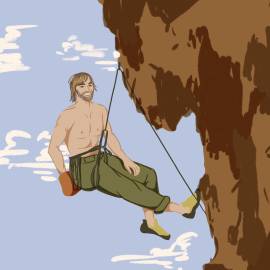
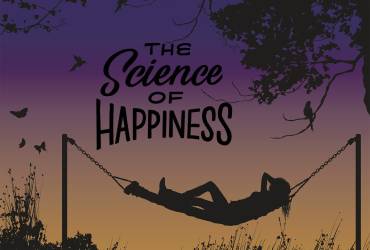
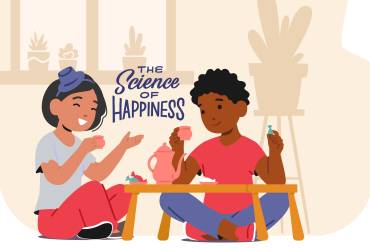
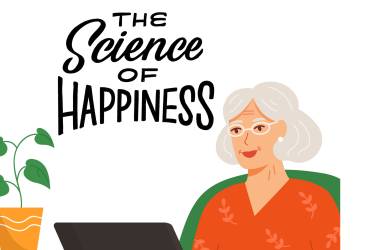

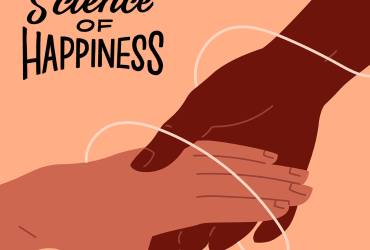
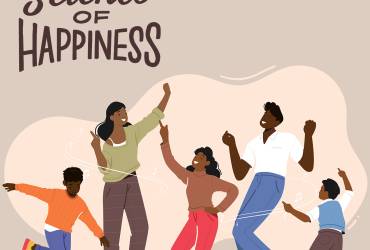
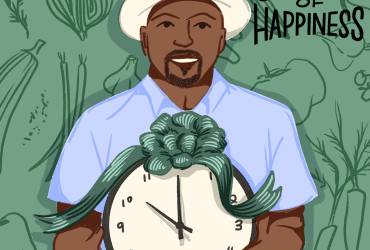

Comments